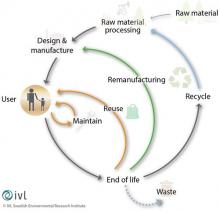In the EU, cities are beginning to address their local carbon emissions through energy efficiency measures, improvements in waste management and investments in renewable energy. Yet, despite the measures, so far there has been little progress on how to reduce the individual footprint, which to a large degree stems from consumption and the indirect footprint that comes with it. As private consumption drives growth, a reduction of consumption as a way to reduce environmental impacts is often seen as undesirable from an economic perspective. Therefore, increased consumption, often encouraged at the political level, is in contradiction to what is needed, creating a catch-22 situation. The result from the POCACITO project shows that changes in consumption patterns are inescapable in order to reach our environmental targets.
At the workshops of the POCACITO project, a circular economy was often put forward as a solution to the dilemma of rising consumption and highlighted as a means to both reduce environmental impacts and create new green jobs. A circular economy as a means to boost local and regional economies is fully possible. According to the Ellen MacArthur Foundation (2015), economically, implementation could increase Europe’s resource productivity by up to 3% annually, which would have positive effects on GDP of as much as 7 percentage points relative to the current development scenario for 2030.
This Policy Brief is the fourth of a series of six that will be produced in the coming days on major issues addressed by POCACITO. It was prepared and written by Albin Pettersson & Steve Harris, IVL Swedish Environmental Research Institute.

